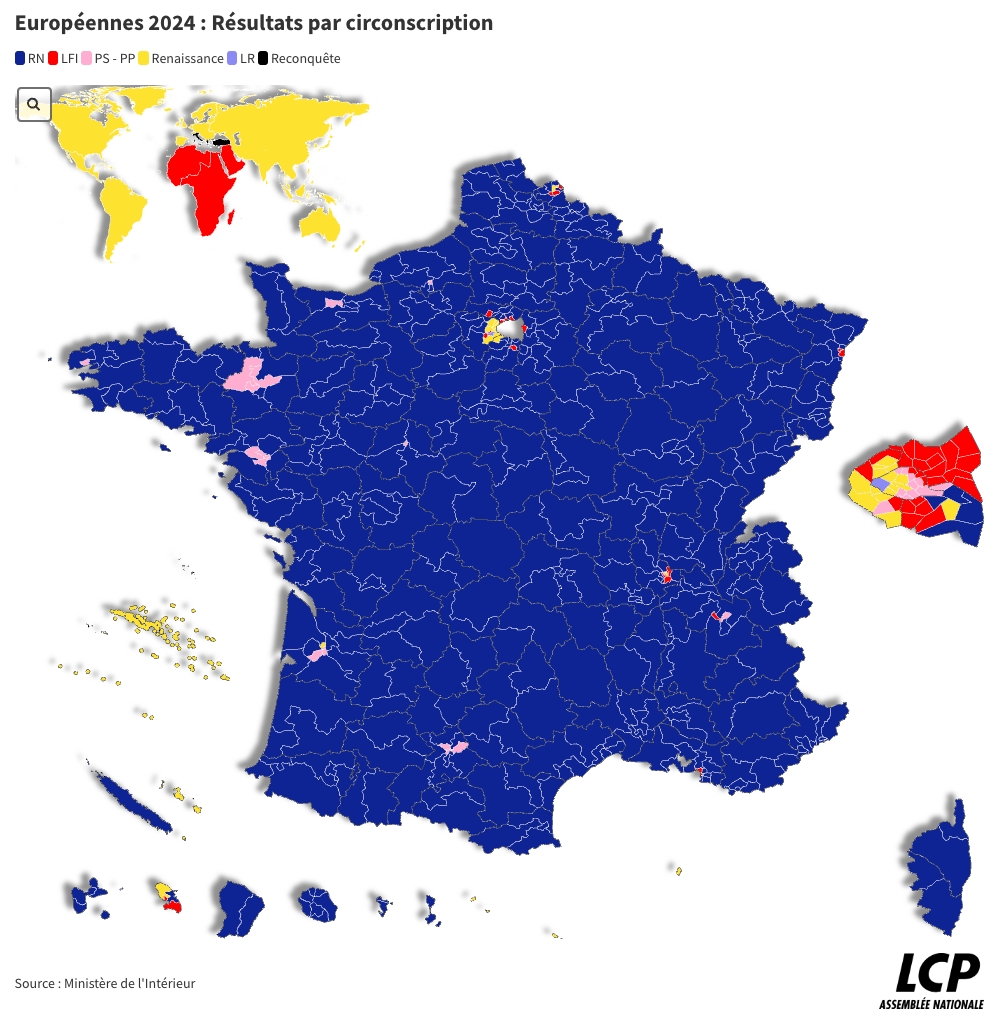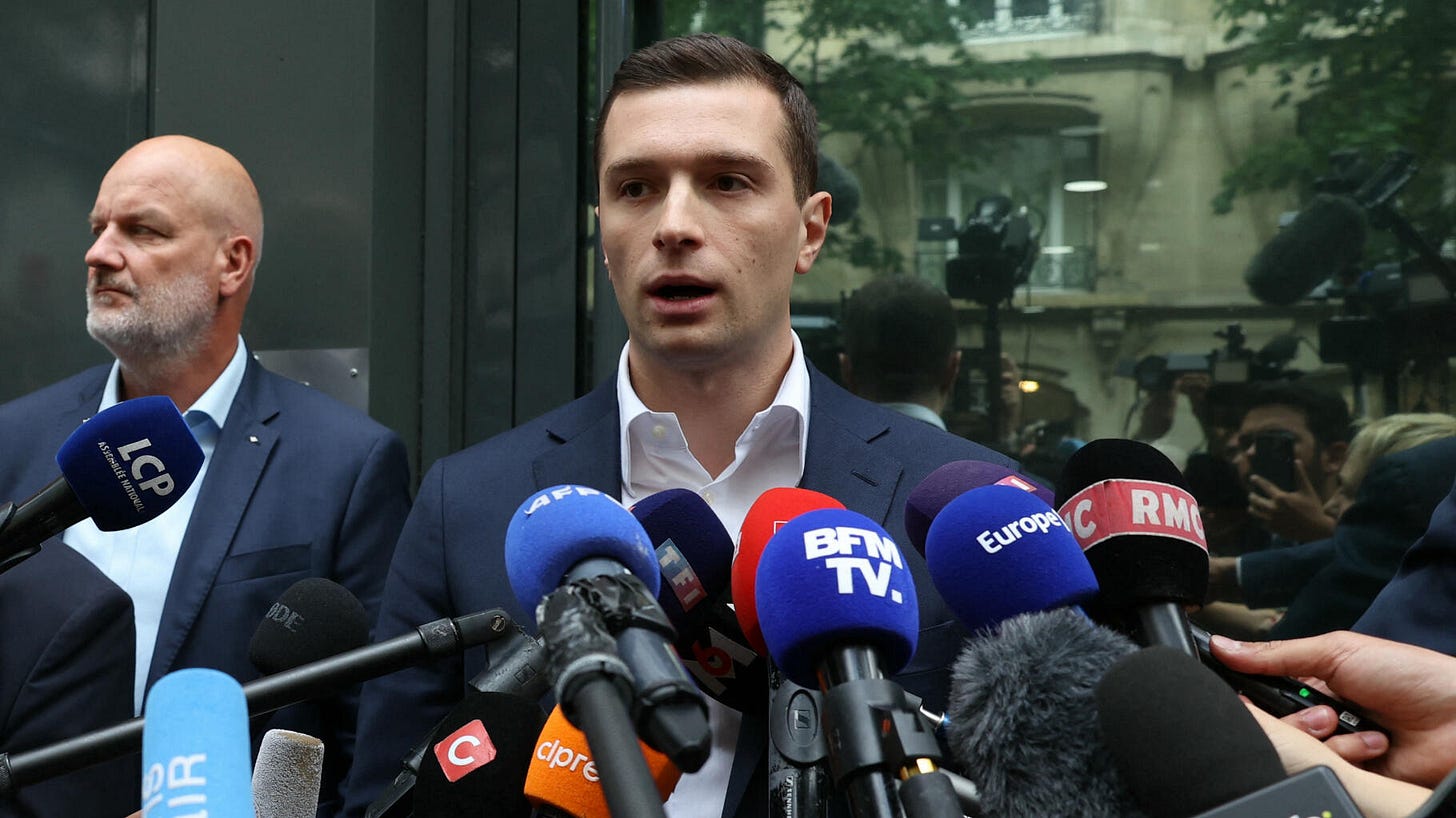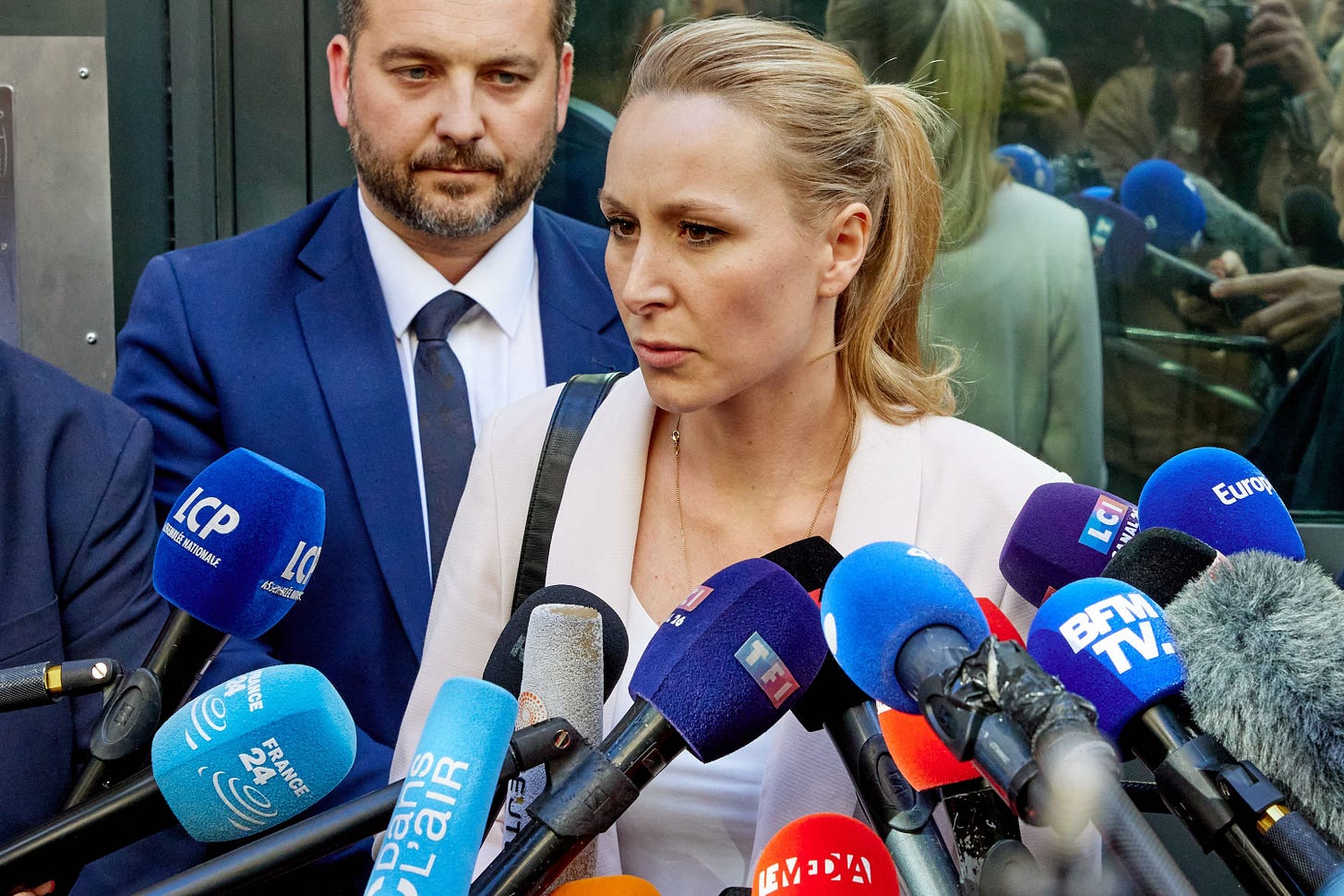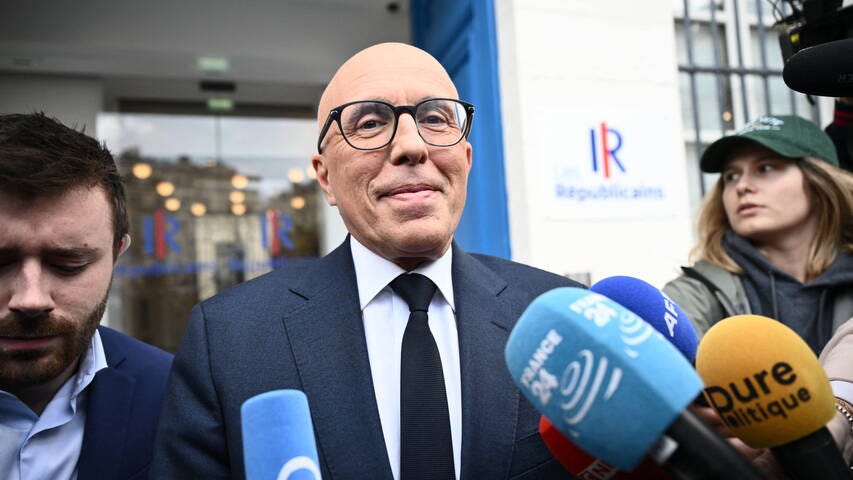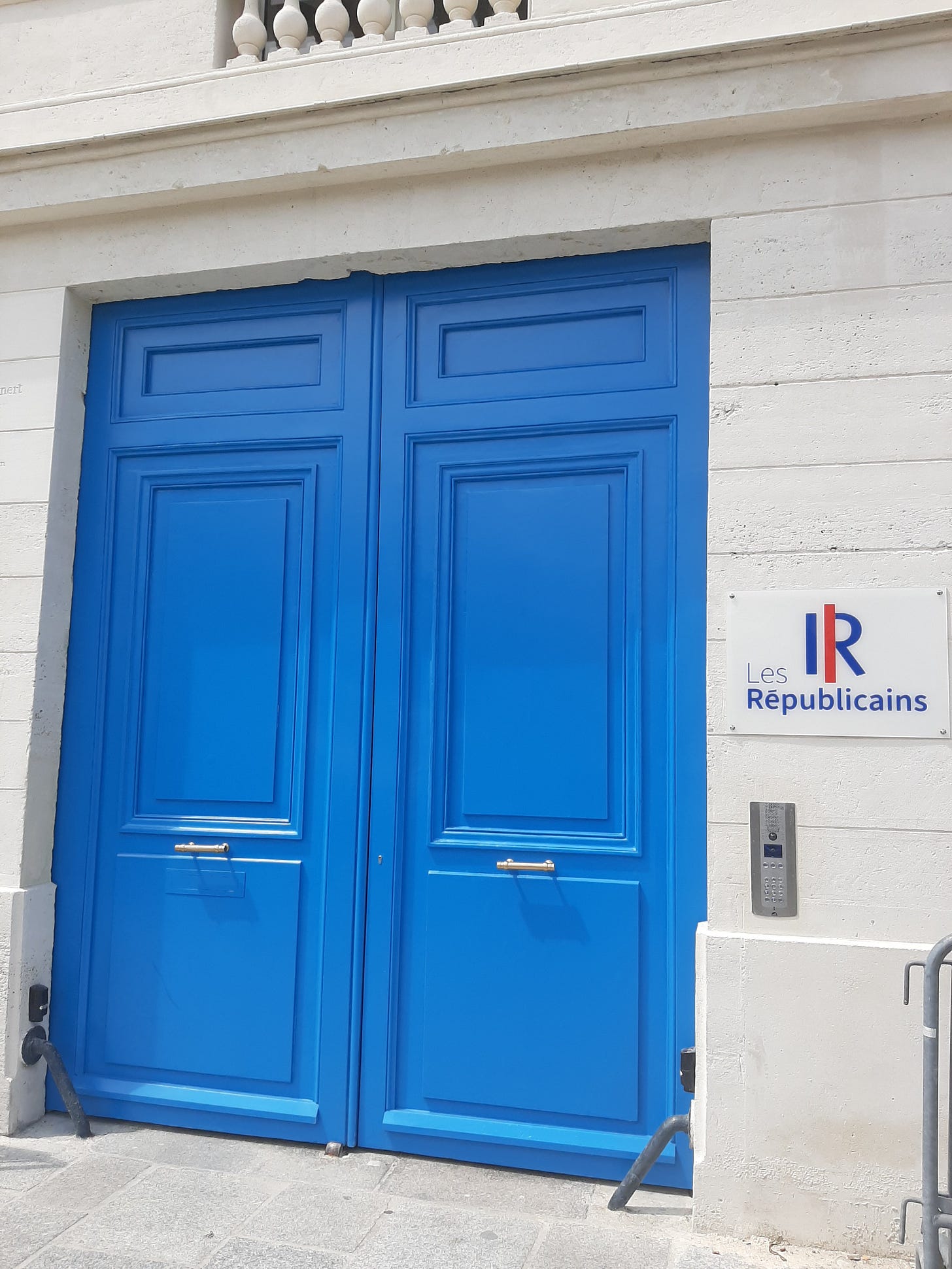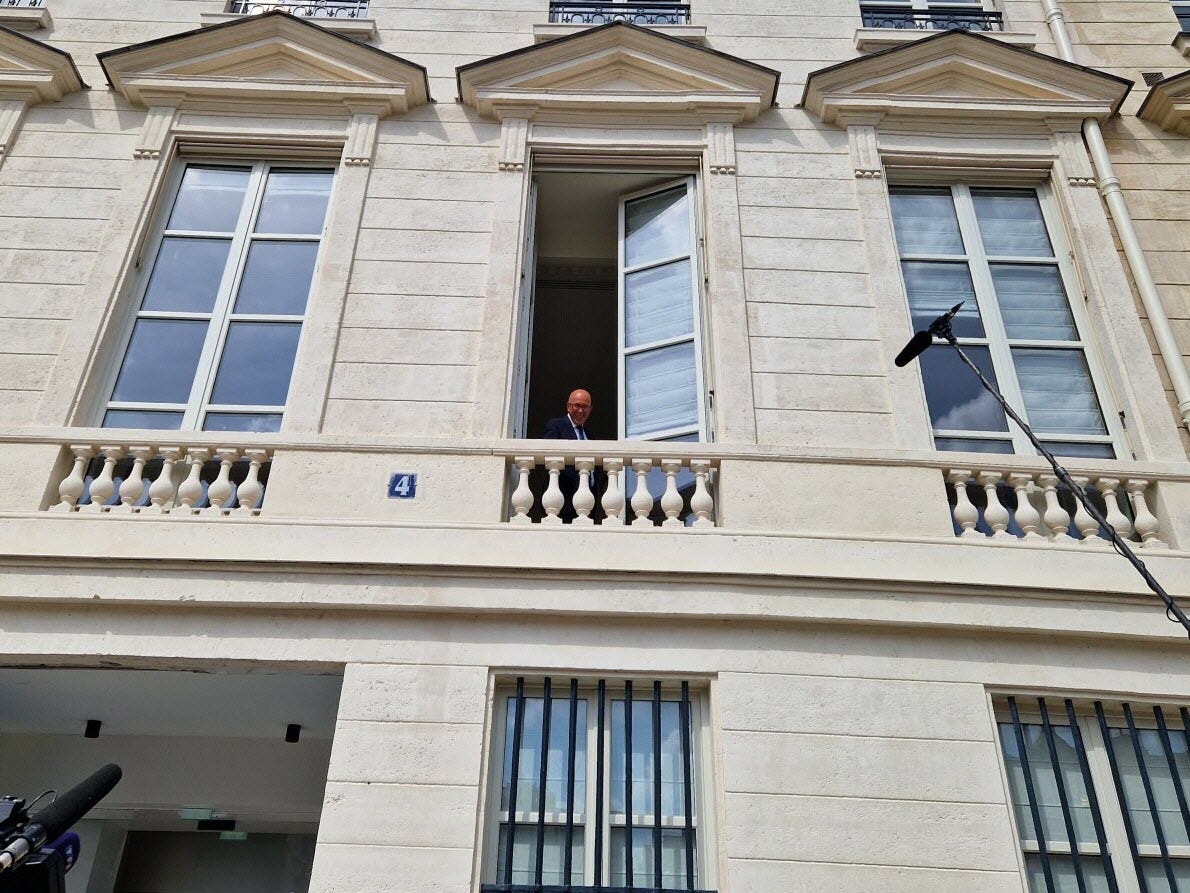The European Elections
On the evening of June 9th, the results of the elections for the European Parliament began to disseminate. Amongst other interesting results, a map appeared on the screens of millions. A map of France. One painted almost in its entirety with the color of the Far-Right.
The list spearheaded by Jordan Bardella, the leader of the Rassemblement National (National Rally) party, intimately linked and founded by the Le Pen family, had achieved first place in a staggering 94% of communes.
Not only had the Rassemblement National dominated the landscape, it had also entirely broken the traditional obstacles to its ascent. Namely: retirees, women, Brittany, and managers (“les cadres”). Furthermore, the often touted “youth vote” which had been destined for the mediocrity of the Green party, had largely defected to the far right.
A jubilant Jordan Bardella gave his victory speech at his party headquarters, demanding new legislative elections as the wind had blown their way. He dared President Emmanuel Macron to dissolve the assembly, and claimed they were ready to govern.
Macron dissolves the Assembly
What Jordan Bardella was unaware of, was that dissolving the Assembly had already floated around the Elysée for some time. The French system of government, restored to its natural form by General de Gaulle in 1958, requires that the Head of State reign supreme. He must set the vision of the state, and to do so must have alignment between himself and the government. Hence, the proper functioning of the Fifth Republic demands that the President and his Assembly be of the same political inclination.
Macron’s increasing unpopularity and attempts to reform a debt-ridden state, however, yielded a disappointing result in the last election. He has been governing ever since with a very slim majority, relying on quiet defections from center-right politicians to pass his motions through. Additionally, his government made liberal use of Article 49-3 of the Constitution to shove bills through the Assembly without requiring a vote.
The idea of dissolving the Assembly had been discussed around December during the first rejection of the immigration bill. But the President had decided against it, as he thought it was not relevant to the mood.
But around May 20th, in a Parisian restaurant, the President and his close entourage (who call themselves “the Musketeers” — including Jonathan Guémas his head of public relations, Pierre Charon a senator for the Center-Right, vice-president of the Publicis PR agency Clément Léonarduzzi, and Bruno Roger-Petit his advisor on remembrance1) decided that the Assembly would be dissolved on the same evening as the results of the European election.
Only a small circle of people, no more than around a dozen including Minister of the Interior Gérald Darmanin (favorite to succeed Macron, and backed by the same financiers) and his closest advisor the Secretary General of the Elysée Alexis Kohler, was informed as to ensure no leaks. Given the rather porous nature of Parisian society, it is impressive that this held all the way until the very last hours.
A little after 7 P.M., the President convened his cabinet as well as the President of the Assembly, Yaël Braun-Pivet. His former Prime Minister Edouard Philippe and the leader of the centrist bloc MoDem had been invited but were unable to make it to the Elysée Palace. The Prime Minister and Head of the Government, Gabriel Attal, learns minutes before it happens that the Assembly is to be dissolved.
As televisions flickered across France, it appeared as if President Macron had called the RN’s bluff. In the headquarters of the different parties, a general confusion and shock slowly erupted as the Head of State declared his intentions on national television.
Over at the headquarters of the Macronist camp, a sour mood could be felt. Many of the people present were activists and even elected officials. They had just been told that their hard fought campaign was for nought and that they’d be doing it all again in the span of a few weeks. Naturally, it also meant the privileges afforded to elected members of the Assembly, having been sworn in two years earlier, were now revoked.
Many of these esteemed individuals had to pay for their train tickets back to their constituencies to prepare to campaign once again. Their election coffers, freshly spent on the European elections, would be refunded by the State eventually but not before the next year.
The next day, the President heads to Oradour-sur-Glane to commemorate the 80th anniversary of the Liberation. There he meets a businessman often seen at the Elysée who asks him: “So, not too difficult these days?”
Macron replies: “Not at all! I’ve been preparing this for weeks, and I’m glad. I’ve pulled the pin off my grenade and threw it at their legs. Now we’re going to see how they handle it.”
The Union of the Right
The political landscape of France had been determined by a recurring dilemma. The Right could govern by a majority, but was divided. The Left was in the minority, but could unite.
Throughout his career as an essayist and reactionary journalist, Eric Zemmour had advocated for the end of this paradigm — the stamp of François Mitterand on French politics — which had begun with Jacques Chirac. In order to become President, Chirac had refused to even debate Jean-Marie Le Pen, and instead allied with the Left. Since then, it had become impossible for the Right to find common ground.
With the results demonstrated by the RN, the time was ripe. After the announcement, the head of the list presented by Zemmour’s party Reconquête, Marion Maréchal — Marine Le Pen’s niece, who defected over to Zemmour in 2022 —, addressed journalists and declared that she would seek an alliance with RN. An incredulous Zemmour could not resist a smirk, he had neither been consulted nor had agreed to this.
“I have always distinguished in these elections the opponents from the competitors, and always refused to concentrate my attacks against the National Rally” —Marion Maréchal
Throughout the European election campaign, rifts had emerged between his own camp and that of Marion Maréchal. Maréchal came over to Reconquête with her own team and operated rather autonomously. This was not so strange, as she was an established politician with an existing brand. Meanwhile, Zemmour’s campaigns were run by his companion Sarah Knafo — an experienced civil servant with a classic technocratic career, and now Member of the European Parliament.
Zemmour had spent the campaign attacking Marine Le Pen and Jordan Bardella’s party. His thesis was that they could never win the Presidency, and should abandon their family shop to consolidate around his own ideas. Zemmour believed that their voters were just as amenable to vote for them as for Le Pen’s candidates, and that they needed to differentiate themselves seriously.
Marion Maréchal disagreed with this strategy, and made it known internally. Even after the results were announced, the teams celebrated separately with Zemmour’s team at the party headquarters and Maréchal and her people in a restaurant next door.
The day after, Marion Maréchal meets secretly with her aunt Marine at an undisclosed location. Then at 5 P.M. she goes over to the headquarters of the Rassemblement National at rue Michel Ange to meet with Jordan Bardella and his team. Marion Maréchal puts forward a list, under her leadership, numbering around sixty candidates from Reconquête and the “sovereigntist” party Debout La France of Nicolas Dupont-Aignan — who was Marine Le Pen’s pick for Prime Minister in 2017. Coming out of the meeting, Jordan Bardella speaks to the press and rebukes Zemmour. He and Sarah Knafo are off the table for the coalition.
“In contrast to Eric Zemmour, Marion Maréchal has showed, throughout the campaign, a constructive approach and attitude.” —Jordan Bardella
Bardella’s team gives until the end of Tuesday to have a final agreement on the list. Marion Maréchal and Thibaud Monnier, the head of the Reconquête federations, work throughout the night to get it done. The next day, the teams meet again and adjust the map.
At 10 A.M., everything changes. Eric Ciotti, the President of the Center-Right party Les Républicains announces that he is open to an alliance with Jordan Bardella. The two camps begin negotiations.
Meanwhile, Zemmour is left entirely out of the loop. He is relentlessly texting Marion Maréchal asking for updates, to no avail. He later posts on his twitter account, that he will receive her later to “ascertain what she is looking for.”
An hour later, Jordan Bardella calls Marion Maréchal. He tells her that the deal is off. The executive committee of the party, led by Sébastien Chenu and Jean-Philippe Tanguy, have made the decision to go on without Reconquête. Now that they are receiving candidates from LR, they determine that they have no need of Reconquête’s votes who will mostly rally to them with or without an alliance. In France, the legislative elections are not only about seats, but also about funding. The State distributes to the political parties 1.50€ for each vote, per year, obtained during those elections.
Marion Maréchal returns to her camp at 4 P.M. The meeting does not go well, the two sides shout at each other. Marion blames Zemmour for sabotaging a potential alliance, who replies: “Then get the fuck out.” Marion, Guillaume Peltier, and Nicolas Bay, the three main figures who had defected from Rassemblement National in 2022, exit the building.
At 7 P.M., Zemmour appears on the TV channel CNEWS. He clarifies that his party is still open to an alliance, and that to show good faith he will not be running in his constituency of choice in order to not impede on the RN incumbent’s chances there — having not even gone onto the second round there in 2022, Bardella could easily interpret this as an empty gesture.
But Zemmour who has been following French politics and its codes for quite some time, believes that the strongest party must propose the alliances. That the strong must seek the weak. This is how it has been, and this is how it should be. Unless the RN proposes an alliance to him, he will run his candidates separately.
“It cannot be because of me: I am asking for nothing. I am not asking for anything for myself, absolutely nothing. Neither constituency, not even obviously a ministry.” —Eric Zemmour
The very next day, Marion appears on the footsteps of the National Assembly in front of the press. She delivers the following statement:
Since 48 hours and the announcement of the dissolution of the National Assembly by the President of the Republic, we have tried everything to allow the 1.4 million voters of Reconquête to be represented in the new coalition of the Right which associates many RN, LR and independent candidates. This new coalition raises an immense hope for change in our country.
Eric Zemmour has decided, despite our opposition, to present the maximum number of candidates against this coalition of the right throughout France, thus taking the risk of losing this unprecedented hope of beating Emmanuel Macron and the far left.
This decision is wrong thrice:
Presenting Reconquête candidates in the legislative constituencies is presenting candidates of division against the national camp and the hope of making our ideas win;
Presenting Reconquête candidates in the legislative constituencies is taking the infinite risk of making Macronist or far left deputies win;
Presenting Reconquête candidates in the legislative constituencies, it is participating in yet another division of the Right and therefore allowing Emmanuel Macron to continue his policy of destruction of our country.
We have an immense responsibility, we cannot miss this historic opportunity to allow the victory of the national camp.
This is why we refuse the principle of divisive candidacies on the occasion of these legislative elections. We therefore call for support, in all constituencies in France, for single candidates of the coalition of the Right.
We therefore ask all the French people who trusted us this Sunday, June 9, to support unity rather than division.
Let us put the interest of France before the interest of the parties.
Let us join forces to inflict a historic defeat on Emmanuel Macron, and prevent the victory of the coalition of the left and the far left which would plunge France into chaos.
The members, activists and executives of Reconquête for whom we have immense esteem and great recognition, can count on us to continue to defend our ideas and carry out our fights.
Interpreting this as mutiny and betrayal, Zemmour appeared the same evening on BFM TV and called her actions throughout the past few days, “the world record of betrayal.” He excludes Marion and those who had signed the statement with her from the party.
48 hours after having won its first seats in an election, Reconquête had just lost 4 out of 5 of them, the fifth being Sarah Knafo. Marion is now securing posts at RN for her people.
In just a few days Marine Le Pen, motivated by a deep dislike of Zemmour, had provoked the implosion of Reconquête.
The saga of Eric Ciotti
Finally we’re getting to perhaps the most interesting and entertaining part of this whole circus. Meet Eric Ciotti, the leader of Les Républicains. A rather milquetoast figure of the Center-Right, but often known for his hardline stances on topics relating to immigration, and security.
I think it’s safe to say that whether for his personal prospects, or other delusions about his own personal destiny, Ciotti has thrown the entire political establishment into a frenzy overnight.
Ciotti had declared in 2022 that if Zemmour managed to reach the second round facing Macron, that he would vote for him. But there was absolutely no question of uniting the Right, working with Le Pen, or any of these things. Indeed, the leadership of Les Républicains is deeply allergic to Le Pen. But the party was on the brink of extinction. The party which claimed to be of the founding line of the Fifth Republic was sitting at around 10%.
Far eclipsed by the NUPES leftist alliance, the growing rightist elements, and the President’s centrist majority, LR had lost its say. It claimed to be of the opposition, and yet regularly supported Macron’s agenda in the chamber. The party needed real positions to court voters or it would suffer the same fate as the Parti Socialiste which had imploded under the Macronist wave.
On the day after the results were announced, Ciotti had already began making overtures to Bardella and Le Pen. However, he had not informed anyone in his party leadership. Instead, he went over to a villa, flying the flag of Brittany on its steps, on boulevard Montmorency in the 16th arrondissement. There, he met with one of the scions of the capital who had long dreamed of uniting the Right. This was not the first visit, instead one following many over the years where “civilizational struggle”, “French identity”, “Christian West”, were regular topics of discussion.
While the financier had backed Zemmour as his champion in 2022, his abysmal results constrained him to falling back towards RN. While he harbored a personal distaste for Marine Le Pen — calling her, “of the Left” —, he had come to appreciate Jordan Bardella.
Ciotti having secured that powerful ally, he made the announcement. A wave of surprise swept through the French political world, and especially across the LR party. The party cadres began rebuking him, claiming that he had made this decision on his own without consulting anyone else. They demanded his resignation.
The next day, the party cadres attempt to form an extraordinary session to relieve Ciotti of his duties. He immediately reacted by reminding the party that he was elected by the party members (meaning a large base of activists) and that such a session could only be convened at the request of the President of the party. Him having done no such thing, he declared any such session illegal and threatened legal actions against the putschists.
Ciotti then had an email sent to all employees in the Party headquarters, instructing them to leave the premises at noon. Security was ordered to evict everyone from the building. Finally, the gates were closed and Ciotti barricaded himself inside.
A laundry list of usual suspects (Valérie Pécresse the failed 2022 presidential candidate and camera aficionado, etc) appeared outside making frowns and putting on very serious faces for the media. Ciotti put out an official statement repeating the above through social media.
The putschists are thus forced to rent another location to meet. They claim that if they “must remove him physically, we will do it.” However, Ciotti is apparently no longer inside the building but “in a meeting elsewhere.” By the end of the day, the LR cadres vote to exclude Eric Ciotti from the party. The official X (formerly Twatter) account of Les Républicains claimed that Ciotti had been excluded.
The leadership names François Xavier-Bellamy, head of the European elections list, and Annie Genevard, secretary general, as interim leaders. Genevard then heads towards the headquarters, reveals she has a duplicate of the keys, and enters the building. After a short walk inside, she comes out again realizing she had forgotten the keys inside the lock. Some time later, the Twitter account is suspended.
Meanwhile, Ciotti appears on CNEWS explaining that he remains the President of Les Républicains and will run candidates along with RN across France to unite the Right. In total, around 60 candidates are proposed from LR.
As if all of this was not enough, the next morning Eric Ciotti arrives at the party headquarters and enters the building as if nothing had happened. He tells the press: “I am President of the party, I am heading to my office, that’s all.” He also finds the occasion to denounce the putschists, saying they are “just a group of people who met beyond any legal scope” and “are not respecting the statutes.” He also mentions that he has begun judicial proceedings against the supposed decision to exclude him.
He then humorously posts a video on his twitter account of him entering his office, and sitting down in front of an empty desk. He appears on the balcony to an incredulous press, and says when questioned on what he is up to: “I am working.” When asked if he has access to all of the building, he replies: “almost.” The Twitter account starts posting in his favor again.
After this humorous exchange, Ciotti heads for lunch and meets with Jordan Bardella. But not before having a judicial officer witness that four out of fifty employees are loyal to him, and that the wifi inside the building has been deactivated.
If Ciotti manages to keep this up until Sunday evening, when the candidacies will be set in stone, and places his candidates with RN — he will have single handedly cut the cordon sanitaire by himself. Already, the defectors are campaigning but without any party logos or branding, as they would expose themselves to legal proceedings should Ciotti prevail in court.
I think that once this is all over, this will be one of the most memorable events of this decadent era of the Fifth Republic. Ciotti has certainly ascended to the rank of popular hero, let’s see if he keeps this up.
UPDATE: The courts have spoken. Even though there were four, five different lawyers all claiming to be representing Les Républicains, the heavens have given reason to Eric Ciotti. He is, and will remain the President of the LR Party and therefore his candidates will run alongside RN.
It is likely all the antiquated behemoths of LR, such as the President of the Senate and other defectors, will be joining Macron in convoluted ways. In fact, they have already began to silently endorse his candidates in many of their constituencies.
Le Front Populaire
There is not much to say about the Left beyond predictable and trivial matters. Overnight, the bulk of the leftist parties announced they would be forming a coalition known as the “Front Populaire”, naturally in reference to the 1930s movement formed in reaction to the Rightist Ligues. The same movement which prevailed in 1936, and led France to one of the biggest disasters of its history, one which almost spelled the disappearance of the very nation itself.
The most interesting thing to point out, is that the party of Jean-Luc Mélenchon, La France Insoumise (LFI) is a bit of a stain for the other members of the coalition. Mélenchon himself is a rather charismatic, bold man who has excellent rhetorical skills. In debates, there is almost no one that can pretend to equal his invectives.
He is also obviously trying to force the fact that after the elections, he should be nominated as Prime Minister. So far, there is no agreement on this point. However, there is also another problem.
President Macron, in one of his speeches of the last few days, branded some in the coalition with the fated phrase “anti-semitic.” The bickering over Hamas, Israel, and other middle eastern issues since last October is yielding its fruits. Many in the Socialist Party are reluctant to ally with a faction with such a stamp, as they would have to justify it later on to their donors and voters.
But it seems like such things simply flow over for the Left. Indeed, leftist communitarian organizations such as Tsedek and the UJFP (Union Juive Française pour la Paix) have already announced that they’d be joining the coalition. In any case, this is raising questions among those who claim personal attachment to this issue, something that has regrettably taken place in France since the late 1960s.
There is also another issue that places LFI outside of the realm of politeness. They have vocally taken the side of Russia in the conflict in Ukraine. This immediately puts them at odds with the sensibilities of the political class.
But the important thing to note, is that besides calculated attacks by Macron the Left has very easily found its unity unlike the Right. And furthermore, it shows that the Left has still not made the conclusions about the events currently unfolding. If they deem that embracing their extremist elements is a necessary evil, then why shouldn’t voters and elites on the Right do the same?
The President
As I’ve said before, the power structure in France demands that the President reign supreme. That all political life revolve around him. Many are asking themselves, what on earth is this President doing?
I think that he’s taking an interesting risk. The center, the polite liberals, the social democrats, are disintegrating. The country is increasingly heading towards political polarization between the most fanatical elements of the Left and the Right.
Macron can either continue to govern with an extremely slim majority, and fight crisis after crisis as he has done for the last two years, or he can turn the table. And that is what he has done. He has placed the onus back on the political class, and on the voters.
If they are dissatisfied, they are free to rebuke him entirely and force him to work with the governing coalition of their choosing. This is a bet that General de Gaulle successfully played after the 1968 riots, but that didn’t go so well for President Chirac.
In dissolving the Assembly, he has also ended the almost perfect synchronization between the Presidential and Legislative elections, every five years following Presidential terms. This arrangement allowed the momentum from a Presidential victory to carry over to the Assembly, as the proper functioning of French governance requires.
Macron has thus far not done much. And yet the entire political landscape has changed. The LR and RN are showing signs of an alliance. Zemmour’s party has imploded. The Left, while not dividing just yet, is showing signs of deep contradictions. Could he manage to rally over the defectors from LR, and some from the Left to a governing coalition? If centrist candidates manage to pull through against either Leftist or Rightist candidates in many constituencies, would the opposing sides abstain or block their opponents by voting for Macron’s camp?
Should Bardella take up the mantle of Prime Minister, he would have to face from his desk at Matignon an incredibly difficult budget vote, the good conduct of the Olympic Games and its security concerns, and to enact the agenda that Le Pen’s political family has been claiming for itself for decades. Should they falter or fail entirely, due to their own incompetence or deep state sabotage, the energy behind their recent victory would deflate and have to be recovered before the 2027 presidential election.
I would not underestimate this President.
“Mémoir” is a term relating to anniversaries, such as the commemoration of WW2 events, etc. Obviously this is a made up position for someone who the President wishes to keep close, as he values his opinion, and his regular historical anecdotes and analysis.




